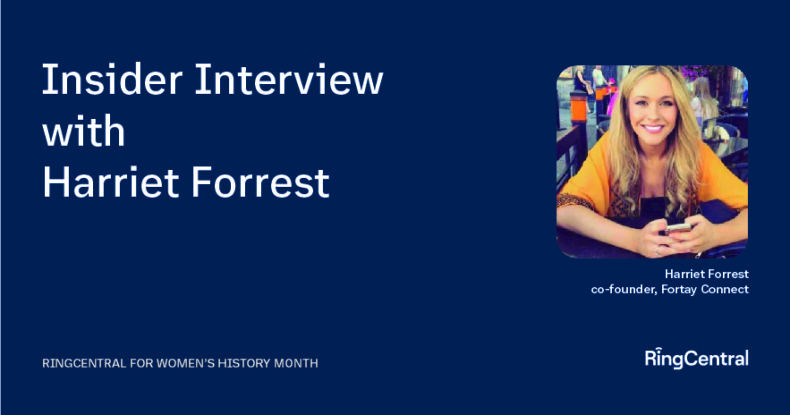During Women’s History Month, we’ve been raising awareness of some incredible causes like The Global Fund for Women and The Girls Network. We are also inviting inspiring women to talk about topics that need more attention.
This interview features Harriet Forrest, co-founder of startup business, Fortay Connect.
What was it like to work your way up to your position co-founding Fortay Connect, and what has been driving you in your career?
One of my first learnings for progression that I’ll pass on is always to apply for the job you want! I read quite early in my career that women are unlikely to apply for a job unless they meet 100% of the requirements in the job description, while their male counterparts will apply if they meet only 60%. Working in technology means the majority of my competition is male. If they are applying, then so am I.
This mentality also allowed the unseen benefit of being the least experienced in any team I joined, giving me a fantastic opportunity to learn from everyone and their success to fast track my knowledge.
It’s not easy to navigate a business for a promotion but always start by highlighting your interest in career opportunities with hiring managers to prevent oversight. Get their feedback on what skills you could improve and understand the requirements of potential future roles so you can showcase some of the relevant skills and experience needed.
Also, know your worth. It can be quite intimidating to question the integrity or value of a decision made by a business. However, businesses and management need to remove ego and listen to their most valuable asset, their staff!
Unfortunately, not every company is the right fit. If a company hired you as an expert and your opinions or views don’t matter, it’s ok to have the confidence to move on.
I’ve always been curious to learn and determined to drive efficiencies and customer improvements. As the market transitioned to the cloud, it became obvious that legacy partners were losing credibility as they resisted the change. This created a great opportunity to utilise my experience and build a specialist business to focus entirely on the customer requirements and journey.
What has it been like running a startup?
A vast learning curve! Extremely exciting, sometimes uncomfortable and definitely nerve-wracking. At the very beginning, every day was different and with that came a lot of unforeseen challenges, thinking on your feet, and making decisions. Decisions are everywhere, big, small and all-encompassing.
There is a real concern for failure and usually a small amount of funding that reinforces the pressure of every decision. You learn quite quickly how to analyse a scenario, consider the risk or value, and decide. You learn even quicker how to deal with failure.
As a business, we have a think fast, fail fast mentality. If someone has an idea, we will generally pursue it. The team has the freedom to fail but learn and try again without any negativity, which is liberating in a startup.
We are now a few years in, and every aspect of the business has been (and is still being) refined – customer acquisition, product development, brand message, management, operations, marketing– the list goes on. These things take many iterations to get right but are also ever-changing with an ever-growing business.
Hiring has been a real turning point in the business. You invite people into something you have incubated, which initially feels unknown. Within a few months, you have some truly amazing staff representing your business with real integrity, which is one of the proudest moments I have experienced.
In a nutshell, I love it. It’s amazing to grow something special for customers and employees from nothing but an idea and some wifi. If you have the itch to pursue something, then go for it!
Are there any moments that stick out as the business has grown?
Absolutely. At first, there were so many tiny victories that felt like a real success across all business departments – our first customer, the website going live, sending an invoice. However, this was relatively short-lived, and we quickly started to experience some real stand out moments.
Last year our revenues grew over 300%, and the team tripled in size. I expect to double our revenues again this year and our headcount. This type of growth is phenomenal for any business, and we have learnt a lot over the last year to fine-tune and continue from 2022 onwards.
In Q4 2021, Fortay finished 5th in RingCentral’s global partner incentive, which has over 14,000 partners. We may be a small business, but this confirmed that Fortay’s strategy, focus, and value differentiates us from the market. We are in the leading position for success.
On a personal level, I was certified as a RingCentral engineer about a year ago. The purpose of this was to understand the intricacies of the solution fully but mainly to add capabilities and value to our customers. Since then, I have deployed over 1,000 seats and developed a services offering that truly matches the customer requirements for migrations that can be complex.
What advice would you pass on to other women and other aspiring entrepreneurs to help them push past stereotypes and reach their full potential?
Stop telling yourself you're not qualified, not worthy or experienced enough to be an entrepreneur. Click To Tweet
Setting up your own business is brave – the world is uncertain, and setting up a business involves a lot of risks, but when we are most uncomfortable, we push ourselves to thrive and grow.
It’s definitely not easy to take the first step, but it’s much more difficult to work 40+ hours a week in a job you hate. Work out the perceived risk of quitting your job and then the potential value of starting your business.
If the value of becoming an entrepreneur supersedes the risk, then start to reverse engineer what risks and sacrifices you are willing to take and how to implement them. This could be moving in with family to remove living costs, quitting your job, testing your product or services with your target market, and getting feedback before going live.
It could also include applying for funding. According to a Tide study last year, 35% of women reported the greatest barrier to setting up a business was lack of funding. In 2020, women-led startups received a tiny 2.3 per cent of venture funding. Thankfully there are now female-focused business funds emerging in the UK. Here are some more insights around women-led startups.
Here are five I’d recommend;
1. Golden Seeds
2. Hatch
4. Astia
5. Abie Awards
COVID-19 had a disproportionate impact on women’s wellbeing, mental health and financial security. What do you think caused this?
For many working women, the pandemic upended their work-life balance. Although removing commuter times has benefited, the change in routine added several extra responsibilities and commitments for many.
It’s no surprise that COVID-19 has had a disproportionate impact on women’s wellbeing, mental health and financial security. Many are now juggling extra caregiving duties as a result of the pandemic. Schools were closed for significant periods, meaning added childcare responsibilities and home-schooling and providing extra care for vulnerable relatives while managing a full-time role.
I think many women feel pressured to be always online from a work perspective, leading to burnout. There is concern that the lack of being seen to be offline (when out of hours) can harm career progression. This stress is causing women to reconsider their options and move them away from roles that may be more demanding.
For some women, the pandemic has led to increased workload, which negatively affects wellbeing and mental health. Still, many other women were furloughed or lost their job due to the pandemic, also causing financial security concerns.
There are some key steps that organisations can implement to prevent any further setbacks in achieving gender parity. Key areas that could improve work environments for women to increase representation in leadership and technical role include;
- True flexible working hours to enable the individual to enjoy a healthy work/life balance, whether that be reduced work hours or working longer for fewer days each week.
- Remove and address any unconscious bias in hiring strategies to target more women – match female salaries to their male counterparts, remove bias around childcare commitments in interviews.
- Greater access to senior leaders and mentors to promote career growth in the female workforce.
- Better benefits, including sick leave or parental leave to attract more females with a family or considering starting a family.
- Accessible learning and development opportunities, such as online platforms that people can complete at any time in small sections.
Originally published Mar 31, 2022

